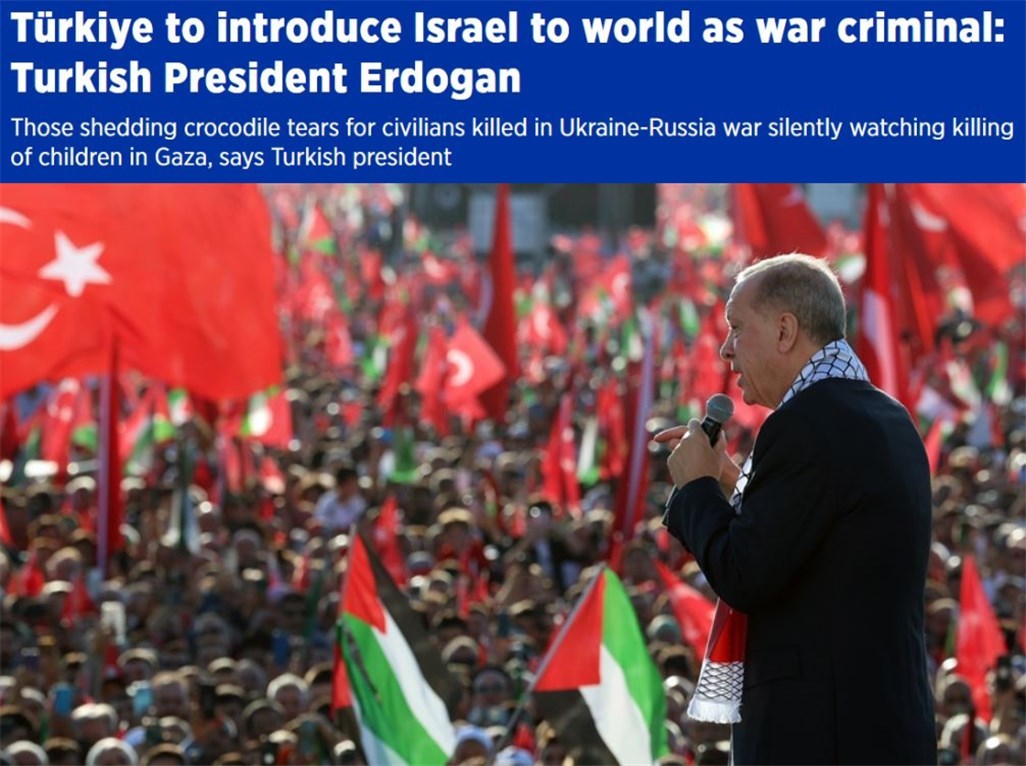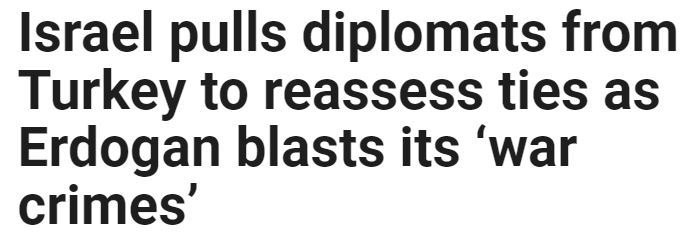Call Israel a "war criminal"! Why Erdogan’s attitude towards Israel is getting more and more fierce?
On October 28th, local time, hundreds of thousands of people took part in a rally in Istanbul, Turkey, in support of the Palestinian people.
Speaking to the crowd at the rally that day, Turkish President Erdogan condemned the Israeli attack on the Gaza Strip as an act of aggression and must be stopped immediately. He also called Israel a "war criminal" and an "occupier" in the Middle East.
Erdogan: "Israel, we will announce to the world that you are a war criminal. Israeli, how did you get into Gaza? You are invaders and occupiers. The Turkish people are all aware of this. Speaking of Western countries, Western countries bear the greatest responsibility for the current situation in Gaza. "

△ Screenshot of the website report of Turkish Anadolu News Agency
After the new round of Palestinian-Israeli conflict broke out, Erdogan’s attitude attracted attention. He first called on all parties to exercise restraint and avoid escalating the situation, then criticized the Israeli air strikes on the Gaza Strip and cancelled his visit to Israel. He also said that some foreign countries are "adding fuel to the fire" to the Palestinian-Israeli conflict in the name of supporting Israel.
In response to Erdogan’s latest statement, Israeli Foreign Minister Cohen said on social media that he had recalled some diplomats in Turkey to reassess the relationship between Israel and Turkey.

△ "Israel Times" website report screenshot
Li Yanan, Associate Research Fellow of Middle East Institute of China Institute of Contemporary International Relations.In an interview with the Global Information Broadcasting of the Central Radio and Television General Station, it was pointed out that in the new round of Palestinian-Israeli conflict, Turkey’s position has obviously undergone a change from restraint to gradual fierceness, and this change was adjusted by Turkey from its own interests:
The reason why Turkey exercised restraint in the early stage was mainly because it didn’t want its diplomatic layout to be disturbed by the Palestinian-Israeli conflict. First, we don’t want to let the process of normalization of Turkish-Israeli relations, which has just started, be impacted. Because the normalization of Turkey-Israel relations is not only related to Turkey’s economy, trade and investment in the region, but also related to whether Turkey can get a piece of the big chess game of energy development in the Eastern Mediterranean. Second, Turkey and both sides of the conflict — — Both Israel and Palestine maintain a relatively normal communication state, which can make Turkey once again become a mediator in regional hotspot conflicts. Third, Turkey does not want to get involved in the Palestinian-Israeli conflict in an excessively high profile as before, so as not to undermine its relations with the Arab countries in the Gulf.
As the humanitarian crisis in Gaza continues to intensify, Erdogan’s restraint towards Israel has become increasingly difficult to maintain. The Turkish side defended Hamas and criticized western countries for supporting Israel, which is actually the result of balancing interests. First, Turkey wants to win the leadership position in the Islamic world. When the Arab world and the Islamic world are increasingly angry about the tragedy in Gaza, it is hard for Turkey not to show its attitude. Second, Erdogan faces domestic pressure. Third, at present, Egypt and Qatar are playing the role of mediators, and Turkey’s purpose of being a mediator is frustrated. Erdogan hopes to arouse the attention of all parties to Turkey.
Li Yanan further pointed out that the new round of Palestinian-Israeli conflict has brought both challenges and opportunities for Turkey to achieve its regional strategic goals:
Challenge 1: This round of Palestinian-Israeli conflict has put pressure on the relationship between Turkey and Israel, and also hindered the overall moderate trend in the region, which has disrupted Turkey’s plan to revive its economy as soon as possible after the election.
Challenge 2: At present, the United States strongly supports Israel, and Turkey is increasingly adopting a strong attitude towards Israel, which will further alienate Turkey from the United States and even NATO, and the differences in diplomatic positions between the two sides on regional hot issues will also expand.
Opportunity 1: At present, Turkey generally supports the Palestinian side, and the positions of domestic political groups and factions on the Palestinian issue are closer. This provides Erdogan with an opportunity to ease the problem of political polarization.
Opportunity 2: Although Turkey’s mediation role in the Palestinian-Israeli conflict has not been brought into full play at present, considering that Turkey has special ties with Lebanon and Iran, and Lebanon and Iran are the key third parties in this round of Palestinian-Israeli conflict, this special relationship gives Turkey more room to continue to play its mediation role.
Source: Global Information Broadcasting "Live World"
General Desk reporter Yang Zhuoying
Editor Yang Nan Li Hao
Signing the trial, Zhang Zhe Shangjuan Zhang Ling